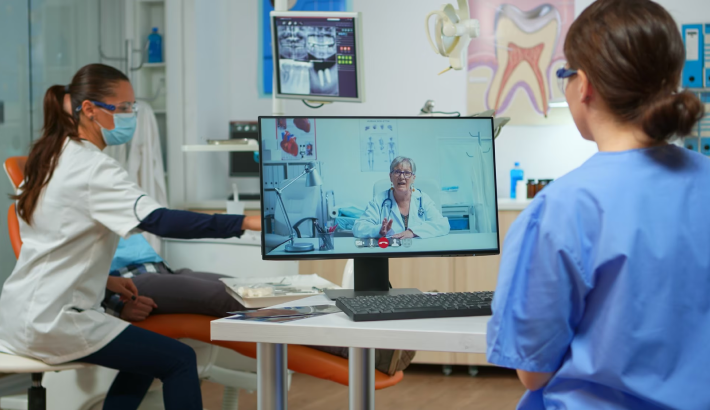Change is all around us, and it is crucial to adapt. Healthcare is one of the industries that develop by leaps and bounds. Therefore, to stay competent and highly professional, medical staff should constantly enrich their knowledge. Advanced healthcare learning management systems help healthcare facilities to cope with this task, which importance is obvious, as all of us want to receive top-notch healthcare services.
What Is Healthcare LMS?
A learning management system or just LMS is eLearning software helping companies create, update, and deliver educational content for their employees,
As for healthcare LMS, it is designed especially for healthcare facilities to help them manage their own online learning programs for doctors, nurses, and other personnel. With their help, they provide training courses, essential accreditation, and ongoing education for their staff. Besides, healthcare LMS can facilitate onboarding, compliance, and knowledge gap analysis.
An LMS plays indeed an important role for healthcare organizations as using it they can train staff on the best practices, cutting-edge technology, new standards, compliance, guidelines, and many more.
Advanced LMSs are rather customizable in order to meet the various needs of healthcare facilities. Using them, it is possible to make up a training course consisting of diverse educational content.
At the end of the day, the healthcare LMS implementation brings numerous benefits to all parties - owners of healthcare facilities, medical staff, and patients.
What Tasks Can A Healthcare LMS Handle?
Healthcare LMS development is gaining momentum as the use of software of this kind helps to efficiently handle different tasks. Here are some of them:
Learning program creation
You can easily complete appropriate training courses in accordance with current needs.
Educational data management
With an LMS, all educational data, including videos, documents, articles, etc. are well structured, managed, and easily updated.
LMS can be accessed by your staff at any time for taking corresponding training courses. What is important is that each of them can study at their own pace while being located in any corner of the world.
LMS enables healthcare facilities to track and assess the learning progress of their staff.
With LMS, healthcare facilities can encourage their staff to freshen their knowledge in order to keep up-to-date with ever-changing healthcare norms and standards.
LMS is a perfect platform for educating your newcomers on your corporate policy, privacy guidelines, compliance policies, responsibilities, opportunities for advancement, perks, etc. With an onboarding course in your LMS, you can be confident that they have access to helpful data whenever they may need it.
Advantages of Using A Healthcare LMS
The LMS implementation comes with multiple benefits. So, it would be unforgivable not to mention them here.
An LMS suggests online learning. Therefore, there is no need to rent conference halls or other facilities, pay instructors all the time, print brochures or guidelines, etc. Once created training course can be reused as often as needed. Users leverage their own devices to access course content.
LMS serves as a single source of educational content and instructions. This helps to provide consistency and great efficiency of ongoing education.
Learning progress tracking
LMS can easily generate reports on reaching learning goals, gaining knowledge, user engagement, knowledge gaps, etc.
From time to time medical workers have to train for compliance purposes. Taking into account the nature of their work, this is understandable. With LMS, it is easy to meet all these regulatory and legal requirements.
Having online training courses, it is painless to keep them always up-to-date. Your learning content can be changed in the blink of an eye.
Medical staff can access training courses at any time that is comfortable for them and from any place and even on the go if a mobile-friendly LMS is leveraged.
Promotion of continuous learning
With an LMS, healthcare organizations deliver online training courses and presentations as frequently as needed. Ongoing learning becomes an essential part of the work for all employees which helps healthcare organizations offer continuously improved services.
Features Essential For A Healthcare LMS
These days learning management systems are full-fledged and offer diverse useful options.
Below the most essential features for a healthcare LMS are presented:
It is vital to define different user roles like instructors, editors, doctors, nurses, etc. Due to this a corresponding access level is given to each user. An LMS should enable you to add users, group them, and assign roles to them.
Instructors should be able to complete well-structured training courses and have an opportunity to edit available learning materials quickly and easily and upload new ones.
In an LMS tasks with various options like multiple choice answers, free text, filling in gaps, true or false answers, etc. must be automatically assigned and assessed.
It is essential to provide course participants with an opportunity to communicate with instructors and each other. On the one hand, this enhances engagement. On the other hand, in such a way instructors can receive feedback on courses and tweak their content accordingly in order to provide better efficiency of the educational process.
Learning progress tracking
A decent learning management system should provide a dashboard representing the learning progress of all users. There should be data on course completion, success, and attendance. All these metrics help healthcare facilities define gaps in the knowledge of their staff.
LMS should provide video conferencing in order to allow users to gain new knowledge and share insights. By recording conferences and making them available in an LMS, you can enable employees, who are not able to participate in an online conference for some reason, to watch live webinars later.
To make the educational process more engaging, it makes sense to provide features similar to those that social media platforms offer, for example, liking, sharing, discussions, feedback, etc.
To facilitate certification within a healthcare organization, an LMS can reward every user with a certificate on the successful completion of training courses or tests.
How To Develop Your Own Healthcare LMS
A healthcare LMS is a special kind of eLearning software. Not only it should consider cognitive capabilities and the best teaching techniques but also the peculiarities of the domain. So, before getting to the active development phase we offer you to review a number of important aspects:
If you would like your training courses to be considered as continuing medical education, then your LMS must be accredited by a corresponding state body. Thus, in the USA such body is the Accreditation Council for Continuing Medical Education. So, it is advised to get familiar with the ACCME criteria if you target the local market.
Compliance with the HIPAA requirements
HIPAA is indeed a must for healthcare apps of all types targeting the USA. HIPAA defines the security standards for apps of this kind. While an LMS does not suppose to deal with health data directly, its content may still include certain sensitive data. Therefore, do not ignore security measures and HIPAA compliance.
Intuitive, simple, but still stylish design can be a real game-changer. Consider the best industry practices along with comprehensive research of the niche, to create indeed a pleasant and intuitive healthcare LMS. The medical staff is indeed very busy, and you should provide them with a user-friendly LMS.
It is crucial to track attendance and measure the progress of course participants. Therefore, your LMS should provide various assessments and generate reports.
The world has been getting mobile. While medical staff always have a lack of time, it is crucial to provide them with the ability to access an LMS and needed learning courses on the go.
Sometimes studying can be boring. Getting familiar with new regulations and policies may sound not exciting at all. To ensure the concentration of learners it is vital to implement in your learning management system gamification elements, for example, a leaderboard, points, levels, badges, etc.
Gamification is a battle-testing practice to enhance the efficiency of the educational process.
Conclusion
The necessity of continuous education in the healthcare industry is doubtless. LMS can help medical staff to get new knowledge, polish skills, stay up-to-date, get certified, and provide awesome healthcare services. The advantages for hospitals and their patients are also obvious. Still, if you’d like to develop your own custom LMS, it is important to take into account multiple aspects some of which we have highlighted in this article. So, do not hesitate, LMS development is indeed a wise investment.



